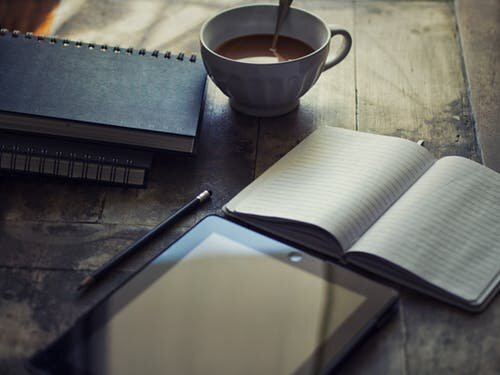Day 25: Words and Pictures: Diaries
What comes to mind when you think of a diary? A school girl’s pink book with a “security” lock on the side?
I am a life-long, half-hearted diarist. I am not nor have ever been a regular journal writer. I go in waves and my content has always been brain dumps. Whatever is on my mind, whatever I am processing or learning shows up on the pages. My only regret is that my handwriting is so poor even now as I reread, even things I wrote yesterday, I sometimes wonder what did I write? I have always had my thoughts run faster than my hands.
I have some of my old notebook/diaries from when I was a kid. They contain the typical kid angst- mad at siblings for some “injustice”, wishing certain things would happen, getting chosen for a lead in a play, choir solo, winning a competition, feelings about friends. I would write about spiritual things too and my understanding of the time of what Bible stories meant to me.
Currently, I journal about everything. I tried having separate books for my writing ideas, for my Bible reading and personal application, and just general life details. Unfortunately I find that numerous books are too much trouble, similarly to when I have too many lists going. The only problem with dumping everything in one place is that it is hard to reference or find an idea that I want to explore.
I was fascinated by the article in last Sunday’s New York Times about diaries found- specifically Dutch diaries from WWII. The Dutch minister of education, Gerrit Bolkestein appealed to the citizens to preserve their diaries and letters. “Only if we succeed in bringing this simple, daily material together in overwhelming quantity, only then will the scene of this struggle for freedom be painted in full depth and shine” . Many are familiar with Anne Frank’s account of her war years. Included in the article were others who described their respective war years- the invasion of the Netherlands, what the day to day life was like in the concentration camp, the famine during the blockades. While diaries used to be seen with disdain as too biased in presenting history, there is now a new recognition of their importance in understanding points of time in our history.
In addition to Anne Frank, I am familiar with Winston Churchill, Nelson Mandela, Captain Scott but I never knew that the author of Robinson Crusoe wrote a dairy about the Great Plague of London of 1665. Daniel Defoe was only five during the plague but he wrote in vivid detail the progress of the disease and the desperate attempts to stop it. What a timely read if I have the courage.
In thinking about diaries, it would be important for us to put on paper what we are witnessing and experiencing. I think it would be helpful not only for ourselves as we process this unusual period in history but also as a first person witness for future generations.
In moving my mother-in-law to an assisted living apartment, we had to downsize her current place. We found old calendars that contained small diary-type entries. Most were daily habits and activities, “dinner with B & C; Knicker’s (family bunny) gave birth today; J’s birthday celebrated with mother and dad,” Some were sad, “Mother died today @ hospital” (How I wished there were more details and feelings about it.) Earlier calendars had entries from her father containing what, from where and cost of any household item- from appliance to hand tool. These snippets give a fuller picture and experience to the verbal stories and the black and white photos and round out family memories.
Journals can also settle family debates. I think it was Madeleine L’Engle who said her journals were helpful when the family would argue over a particular happening. When one person would insist that such and such occurred and the other family member insisted that something else happened, she could pull out her dated journal entries to “settle” the debate. There are some things that cannot be googled.
I am thinking of journaling more about this pandemic experience. Not from any profound, philosophical standpoint but rather from a catalogue about the small day-to-day details: making and wearing masks, the phenomenon of youtube/facebook live streams and zoom chats, walking and social distancing.
What about you? Have you ever kept a diary? Do you still? What is in it? Why do you keep one? For future generations? As a coping mechanism for stressful times? As a remembrance of events- good and bad?
The physical act of writing on paper can help us process our anxiety, fears, and plans. It doesn’t have to be great prose. Just a list or phrase will do. One can use an “official” journal, or notebook pages or calendar entry. It might be a series of written letters never sent.
Whether or not we will ever share them or not, it is helpful to have a physical remembrance of our specific time and experience on earth. You might even want to rid yourself of them at some point. I am thinking those childish ones might need to go some day. Although there is something to be gleaned even from rubbish diaries. While I am a far cry from being significant like her, I think it is a great loss that Queen Victoria’s original dairies from 1840 onward were mostly destroyed.
During this time at home, why not think about recording what is happening around you? For all you know, what you observe might be helpful to someone in the future.

